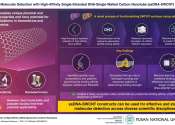Researchers explore interplay between high-affinity DNA and carbon nanotubes
Single-walled carbon nanotubes (SWCNTs) have emerged as promising candidates for applications in biotechnology and nanoelectronics due to their exceptional physical and chemical properties. Despite their potential, challenges ...









